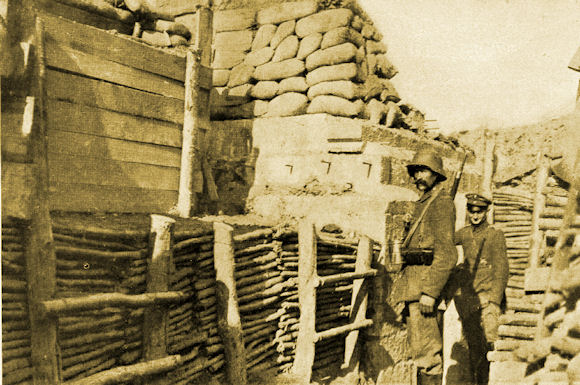 |
| German Defenses at the Somme |
Offizierstellvertreter Heinrich Conrad
9th Company, 8th Bavarian Infantry Regiment, 10th Bavarian Division
At the opening of the battle of the Somme the 9th Company was led by Leutnant der Reserve [Hubert] Meister. The company was occupied digging at night behind the front at different places. The thunder of cannon fire growled ahead continuously, and by day a countless number of enemy captive balloons hovered above the front, observing every movement in our lines.
1 July
A state of highest alert exists, but everything is quiet. It is Saturday. Up at Thiepval the sound of steady, heavy shellfire can be heard. What's going on there? We don't know. Afternoon arrives lazily. We talk, smoke, sleep. Who knows what night will bring.
"Where is the company commander?" shouts an excited voice from down the trench.
"Who wants to know?" I ask.
"A messenger."
Leutnant Meister appears in the dugout entrance and is handed a dirt-smeared paper with the report: "Enemy has penetrated the Schwaben Redoubt." The regiment's 1st and 2nd battalions, along with the 11th and 12th companies, must counterattack; the 10th Company will occupy the 11th and 12th's vacated position, and we are to take over the 10th's sector. Hurrying to our new destination we find it in a sorry condition. The trenches are barely knee-deep, and there is no trace of dugouts. Some shell holes in the position's forward area are fortified and we seek cover in these from the enemy's increasingly heavy artillery fire. We find here the bodies of the regiment's, and the battalion's, first casualties of the battle. How many of our own company will join them?
We lay in the open barely 200 meters behind Mouquet Farm. Shortly before 6 p.m. another messenger arrives, bringing new instructions: "The 9th Company will advance immediately to the Wundtwerk."
"Everyone ready! Let's go!"
With Leutnant Meister and I in the lead, we pass the ruins of Mouquet and move through Josenhans Trench, badly battered from shell fire. We encounter a large
Württemberger going in the opposite direction, his hand bound with a bloody rag.
"What's going on up there?" we ask.
"Those dogs, those damned accursed dogs!" comes the reply. He thrusts his injured fist in the air toward the rear, and continues on.
Just then a shell whizzes by a short distance over the trench, followed by a second. It explodes in the vicinity of the 1st Platoon. Screams! Albin Bauer, our drummer, is badly wounded. A piece of shrapnel has torn into his chest. Stretcher bearers quickly attend to him while the rest of us move forward again. The ground slopes upward. Seen from the shell-plowed summit the entire area is a gigantic, gray-brown field of craters. But there, beyond the devastation, a river gleams in the shadow of a green wood. Is this where peace lives?
 |
| German Soldiers at the Somme |
We lay in the Wundtwerk, bathed in sweat. Water! Water! The last drops are gone. My batman, Karl Guth, takes both of our water bottles and his boiler, then disappears. After a while he reappears completely breathless, but with a cunning smile on his face. All the containers are filled with excellent coffee. The water boiler is passed from mouth to mouth until it is empty. Guth explains that, along the way to our position, he noticed a field kitchen from which he "liberated" the welcome antidote for our thirst.
After dusk an officer visits and orders yet another move. ''At 4 o' clock tomorrow morning we counterattack." I nod to him. The men silently proceed in the blackness through the Konigstrasse to our newest destination, the Hindenburg. Such is the appellation for the corner junction of the Konigstrasse and the Hindenburg Stellung, named for the famous army commander to designate the first-line trench here. The front line originally ran from Thiepval south-southeast to the Ovillers-Authuille road, then curved sharply eastward for some 800 meters until dropping south again toward Orvillers and La Boisselle. The point of this curved salient has been captured by the English. The 9th Company is meant to bolster the threatened Hindenburg position, whose barricaded corner section we reach at 11 p.m. We find all that remains of the 99th Reserve Infantry Regiment's 3rd Company under the command of two officers. The 180th Regiment should be on the left, but where? No one is sure.
The entire company front measures about 250 meters in length. A delicate situation exists for no one seems to know how far the enemy has penetrated on our left. In the piece of line lost to the English there is a stone quarry, which the enemy may now be filling with men and material. "This quarry must be taken!" So reads our order. After a consultation with the two officers from the 99th's 3rd Company, Leutnant Meister issues his own orders. The 2nd and 3rd Platoons will attack: on the right, Unteroffizier Weindel with three sections of the 3rd Platoon; on the left, the rest of the 3rd Platoon under Vizefeldwebel Walcher; I am to lead in the center with half of the 2nd Platoon. The 1st Platoon is our reserve and is to remain in dugouts of the Konigstrasse and Lemburg-Stellung. Hand-grenadiers are selected and all other preparations made. This finished, we then sit leaning or dozing against the trench wall to wait for zero hour. Wallcher, who earlier in the war at Soyecourt shared a dugout with me for nine months, is seated at my side and soon drops into a deep sleep, completely unconcerned with what the next hours might bring.
Source: Carnival of Hell by Richard Baumgartner

Excellent to have this perspective.
ReplyDeleteThose soldiers would have enjoyed that coffee!
ReplyDelete